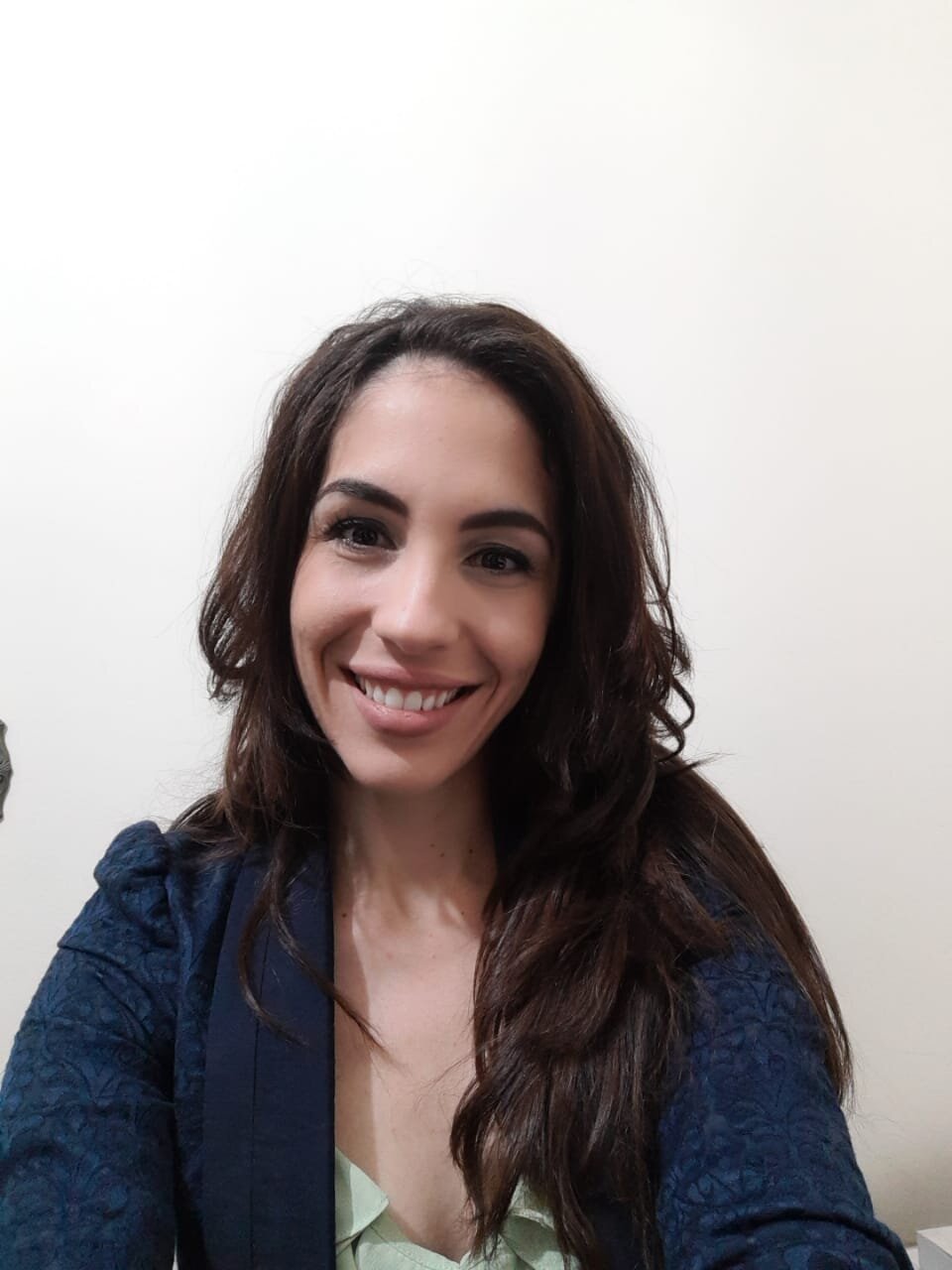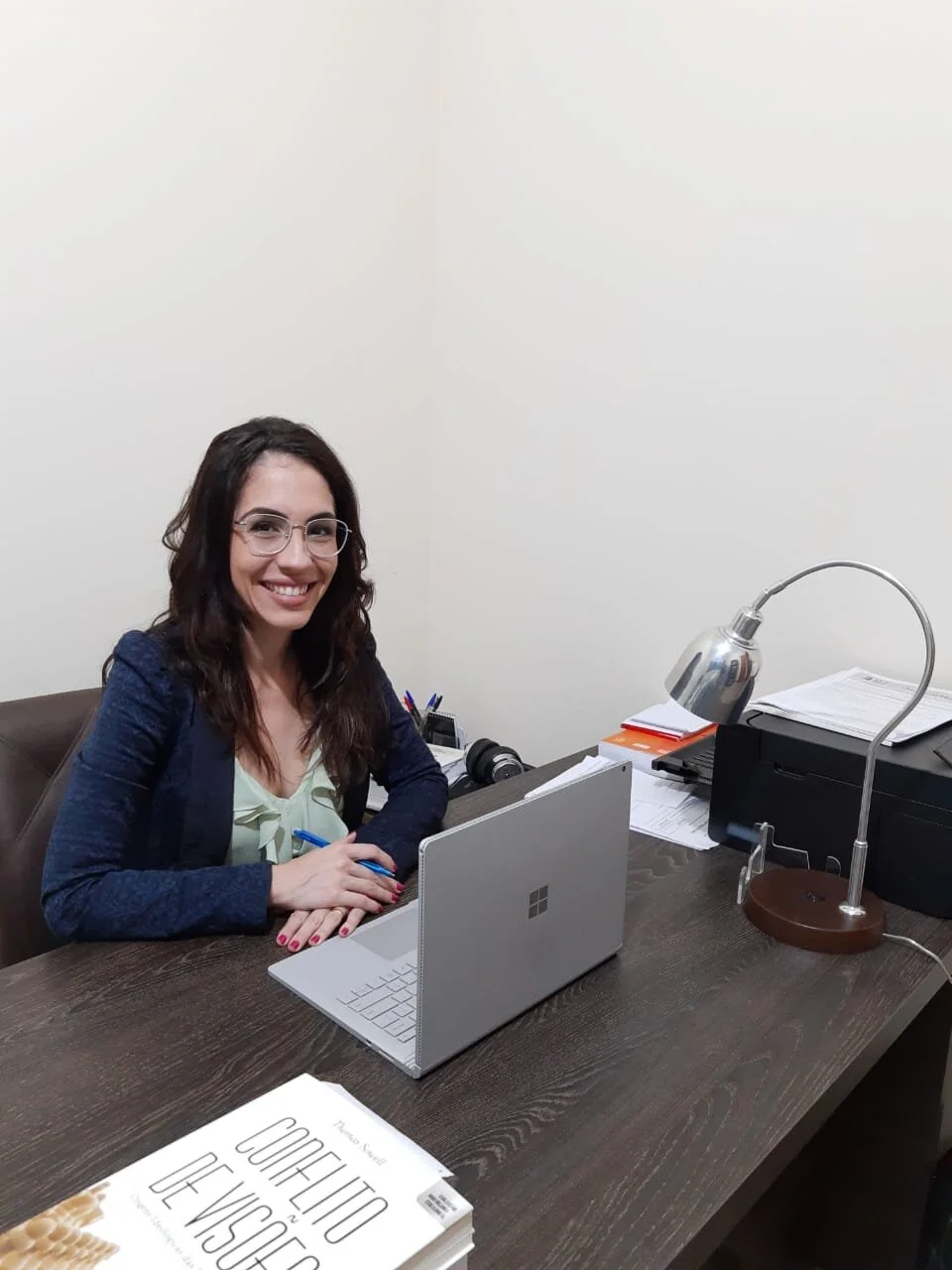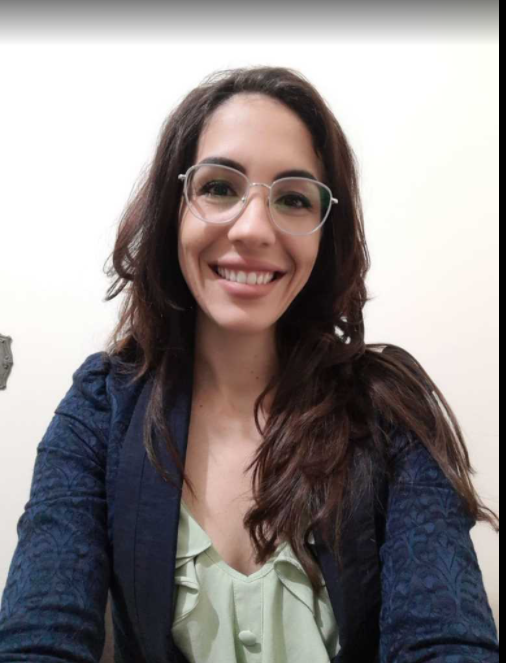S01 - E16 - Talita, my online Portuguese teacher
Talita is my Brazilian Portuguese teacher and I have been taking classes online with her for many years. I couldn't ask for a better teacher and I have also had the pleasure of teaching her English. In today's episode, we talk about what it is like to be an online language teacher and about our shared love for languages.
Take Brazilian Portuguese classes with Talita - https://www.italki.com/teacher/3132449
S01 - E16 - Talita, my online Portuguese teacher
Full intermediate level ESL podcast transcript
Support the show (https://www.patreon.com/lovetolearnenglish)
Rich: Hi everyone. My name is Rich and welcome back for another great show. In today's episode, I'm speaking with Talita, so Talita is actually my online Brazilian Portuguese teacher. If you're interested in learning Brazilian Portuguese, I highly recommend her. We'll put a link to her profile in the description below. In today's episode, we're going to be talking about what it's like to work as an online language teacher and a little bit about differences between different languages. As Talita is a non-native speaker, when she makes mistakes, I will try to correct her and give little explanations that will work kind of like a mini class in the….in the podcast. Without waiting any further, let's get on with the show. Hey, Talita, how are you?
Talita: Hey Richard. I'm doing great. How about you?
Rich: Very good too. So, welcome back for another episode. I'm so glad that you could join me again.
Talita: Thank you for inviting me.
Rich: Perfect. So today we're going to be talking about being an online language teacher and what that's actually like. So, you're my Portuguese teacher and a very good one, I would say.
Talita: Thank you
Rich: So, today the roles are reversed a bit because...
Talita: Woah…
Rich: Yes, we're in English today. But I think it's a really interesting job...teaching online. But I have some questions just for you first...So, how many languages do you speak?
Talita: Oh, I speak Portuguese. That's my native language. Uh, I speak English, although I make many mistakes. I speak French. Uh, I'm learning Spanish, and I started learning Russian, but I have a long way...
Rich: A long way…
Talita: ...to actually speak it yet.
Rich: So yeah, a lot of languages. What age did you start with languages? Have you always been bilingual? Did you start much later?
Talita: No, when I was 11 I started to study English at English school, and at college, I began studying THE French language, and then I went to French. So, we study and there I have practiced French and English language and now I practice my English with you.
Rich: And now English. Yes. So, we teach each other.
Talita: Yes…
Rich: To use an idiom. It is the blind leading the blind. Do you know this idiom?
Talita: Cool. Yeah.
Rich: Yeah.
Talita: Makes sense.
Rich: Yeah. Um, but I think teaching online is a really interesting job. What do you like about teaching languages online?
Talita: Number one, that you teach at home.
Rich: Yeah...
Talita: And that's so cool because you don't need to put on shoes, for example.
Rich: Yeah no shoes, no socks sometimes.
Talita: No socks, no socks. Yeah. And you make your own schedule. Uh, and, uh, also one to one lessons it’s better for learning in general, I suppose because…
Rich: Yeah I think so…
Talita: The students, they have to be 100% focused all the time. So, I think that’s a very effective way, uh, for learning and it's comfortable for both students and teachers.
Rich: Yeah, I think, I think I would agree with that as well. I tried lessons in groups for actually, and I didn't learn very much. I did French and Welsh in school and I did not learn very much in a big classroom. And I think the reason is you get much less time talking…
Talita: Mhmmm…
Rich: …compared to an online class where you'll have the whole hour with the teacher that maybe speaking for over forty-five minutes of that hour. So, there is a big difference in that.
I do like the online way of learning. I want to go back to the languages that you speak very quickly. So, do you have a favorite language?
Talita: Uh, yes. It's French.
Rich: Why French? Why is it not English?
Talita: No actually, um, English could be my favorite. Yes, you're right. But French…
Rich: That was not convincing…
Talita: Yeah...but French is so beautiful and I don't know. I have this passion.
Rich: Yeah. The French language does sound good, I think. In the UK we use a lot of French, you know to be fancy.
Talita: Yes, but I prefer to speak when I'm traveling for example I prefer to speak in English because French is more tiring to speak because you have to make all of those movements with your mouth and so on.
Rich: Yeah
Talita: So, if I'm tired, I prefer to speak English.
Rich: Yeah. English is much easier, I think than French, both pronunciation and grammar overall. Which is the hardest language then? Is that French for you?
Talita: Uh, between English and French?
Rich: Yeah...
Talita: French. French is THE hardest and I think I have studied more French than English. I don't know how much I studied more, but I think that sometimes I'm better in French than English because the pain ??? 6.13 that it's harder.
Rich: Yeah. I think every language has difficult points that are very complex. But I think overall English is quite simple. The problem with English is that there are so many irregular things in English. So for me, as a student of Spanish and Portuguese, it's so much more logical. As an English, as a teacher, I get very frustrated often because the student will say, why is it this in this case and that in that case? and I just have to say, it just is. There's no reason often.
Talita: And do you think that most of the mistakes your students make are related to their native language. I mean, when they make a mistake, it's normally because they are thinking in portugese.
Rich: Yeah.
Talita: And it's the same with other languages.
Rich: Yes. You do see very commonly students from the same language background making the same mistakes.
Talita: Mhmmm
Rich: It's very...very common. So, um, for, for example, my Russian students often say things like,
“I like dog” instead of “I like the dog”, right?
Talita: Mhmmm
Rich: So, whereas the Brazilians, they always use the article ‘the’. They say things like “My favorite subject in science is the biology”.
Talita: Uh yes yes. We love articles.
Rich: Yeah. So, you add...you guys actually have the opposite problem because in the Russian language, for example, they never use articles, they don't use a, an, or the, whereas in the Brazilian language or Brazilian Portuguese language, you guys always use them.
Talita: Mhmmm
Rich: So you get, you've got like, you've got the same problem, but the opposite cause.
Talita: Yeah
Rich: There are, there are many of the situations you can think about, minimal pairs, so common one for Brazilians is E. And if those two sounds like he, his, the difference here is not very obvious for a well a Russian or a Brazilian actually. They both...both those languages have problems with these two particular sounds. So, you do find that the students have similar problems.
Talita: Mhmmm and that’s wonderful right?
Rich: It makes it a lot easier. Yeah. There's a really great book called learner English by a guy called Michael Swan. I'm not being paid for this reference, but it's really good. And it has chapters on how to teach students from different language backgrounds in English.
Talita: Mhmmm
Rich: It's really interesting cause if I get a student from a new place, I normally will read that chapter on with their problems and then I have a pretty good idea of what they're gonna get wrong. Very interesting.
Talita: Cool. I'll look for it. Nice. Thank you.
Rich: So, what do you think the benefits are of learning languages? So, you obviously like me have a big passion for this, so why? Why learn a language?
Talita: Uh, okay. My favorite reason...my favorite reason of all is traveling.
Rich: Family..?
Talita: No traveling.
Rich: Oh, traveling. Sorry. Okay. Okay. Yeah.
Talita: I love traveling. But also I think I’ll never stop learning because of the benefits TO memory.
Um, like it makes your brain work.
Rich: Yeah, I think that's really true.
Talita: Healthy… It’s therapeutic. If I can say that.
Rich: Therapeutic...therapeutic is the adjective.
Talita: Ah...therapeutic.
Rich: Therapeutic…
Talita: And uh...I mean, if you take...I don't know...like English and a Spanish, imagine how many people you would be able to talk to. So, it opens...it imaginable doors.
Rich: If we speak about English, Spanish, you missed the ‘about’ them. But yeah,
Talita: No. No. I mean, if we speak the languages.
Rich: Oh, if you...Oh... sorry. Yes. No. Right yeah. Of course. Yeah. If you speak those languages, you get access to so many people. For me, it feels the process of learning a language feels almost as if there's a really big wall between you and the millions of people and you get a very small hammer and you start just hitting this wall. It's a huge wall. It's like Donald Trump's wall.
Talita: Ahhhh…Yeah.
Rich: And eventually, eventually you hit, you hit through the wall and you come out on...at the side, and then suddenly a new world is available to you.
Talita: Cool..cool.
Rich: A language is like, it's a big wall, right? And when you get to the other side, which it takes a very long time to do this, but when you get to the other side, it's so amazing because you have so many new ways to think, new conversations that you can have.
Talita: Mhmmm
Rich: Different people you just do not have access to before you do.
Talita: Yeah. And for me and you that, uh, we obviously are passionate about languages. It seems so obvious. Uh, but some, some people simply, they think that's too difficult because they have some different kind of intelligence. But that's when gets more ??? 12.41 traction because when it's harder,
Rich: Yeah...
Talita: ...once you make it, it’s even better.
Rich: Yeah. Well, I actually can understand that as a point of view because when I was younger, I did not really have passion for languages. I had a passion for English, but not for other languages. I tried French and Welsh, as I have mentioned before, but I never connected. Never really got it. But with Portuguese, because I needed to learn the language cause I moved to Brazil.
Talita: Mhmm
Rich: With this language, it was amazing. The first time I heard it, it just sounded amazing. I liked the way things were pronounced. I liked the culture. I liked everything about it in a way that I didn't like or connect with French or Welsh. And that really changed my mind because I committed to learning it and I got to the other side of the wall because in the beginning when you're learning ‘apple’, ‘rice’, ‘I like’, ‘car’ . You couldn't….that's not...it's not interesting. It's only when you get to the other side of the wall and then you get to that new world that it opens for you that you think, wow...that was...this is worth it.
Talita: Yeah
Rich: It's very hard to get there. I think that’s the problem.
Talita: Yeah but, once you get there is no way to stop practicing.
Rich: No. Once you, once you have that feeling, it's hard to not, not want more of it.
So, just very quickly, I want to talk about finally today, the differences between English and Portuguese and other languages...French and so on. In terms of why people study them because I think it's actually very different because the reasons people study English are very different to the reasons that people study Portuguese right?
Talita: For sure. Uh, okay. So people learn, normally my students, they learn for passion because, uh, it's difficult for someone to learn Portuguese because they have to.
Rich: Yeah.
Talita: Uh, and all of my students, they speak already English at least, and or English and Spanish, and they are going to start learning Portuguese.
Rich: Yeah.
Talita: At least half of my students are learning because they have some Brazilian girlfriend or wife.
Rich: Me
Talita: Yeah.
Talita: So, one of the biggest reason is love
Rich: Yeah, language of love, I think.
Talita: Yeah. So it's not French, it's Portuguese. So, that's quite a motivation for them.
Rich: Yeah.
Talita: Yeah, but I had like two or three students who like...they wanted to work in Brazil because they had some offer or they went to apply for a job that they needed. But they are like, I can count in my hands
Rich: Yeah… very small. Mhmm...
Talita: So, as they learn for fashion and for fun, it's….it’s like it's simple, which means it's like their hobby.
Rich: Yeah. Sometimes they use Trogo like subjunctive ???
Rich: Me
Talita: As you know...But it's part of the journey.
Rich: Yeah. Yeah. That's the thing to learn a language, you must be consistent, I think, and you have to have passion.
Talita: Mhmmm…
Rich: With English, obviously it's very different, people need English. Much more than they need some other languages, but I think any language really has benefits. Um, I would encourage anyone who, even if you're just listening and you only speak English, try and learn something of another language as well, just for fun. I know it's not fun for most people, but eventually when you get to the other place when you can communicate. It's really magical, I think.
Talita: Yeah, I agree. That's true.
Rich: Okay. Talitia, so thank you so much for joining me for one more episode. I hope to see you in another episode soon. Okay.
Talita: Thank you Richard for having me.
Rich: Thanks Talita. Bye now.
Talita: Bye-bye.
If you notice any errors or would like me to add something to the transcription please email me at info@lovetolearnenglish.com



